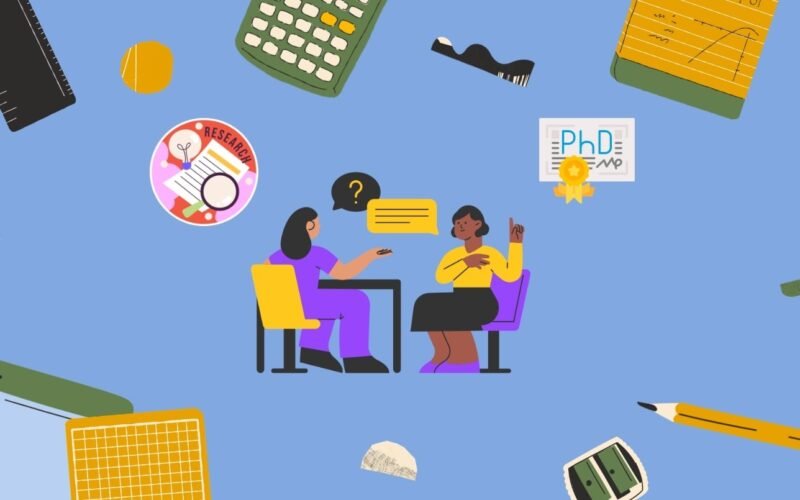Securing a PhD interview is a huge accomplishment—you’re one step closer to pursuing advanced research in your field. But now, the real test begins: How do you prepare for the PhD interview?
Table Of Content
- Why Preparation is Key to a Successful PhD Interview
- Understand the Purpose of the Interview
- Research, Research, Research!
- A) Research the Program and Department
- B) Learn About Your Potential Supervisors
- Prepare to Discuss Your Research Interests
- How to Prepare Your Research Pitch
- Be Ready for Common PhD Interview Questions
- Dress Professionally, But Comfortably
- Practice Your Presentation Skills
- What to wear for a PhD interview
- Get Familiar with the Interview Format
- Common PhD Interview Formats
- Ask Your Own Thoughtful Questions
- Questions You Could Ask
- Stay Calm and Confident During the Interview
- Final Tips and Strategies
- FAQs
- 1. How should I introduce myself in a PhD interview?
- 2. How long does a typical PhD interview last?
- 3- What if I don’t know the answer to a question?
- 4- How important is the PhD interview?
- 5- Should I mention other applications during my interview?
- 6- What should I avoid during a PhD interview?
This guide will walk you through the essentials, from researching your potential supervisor to mastering your academic pitch. By following these steps, you’ll enter the interview room feeling confident, informed, and ready to impress.
Why Preparation is Key to a Successful PhD Interview
The PhD interview is not just a formality. Preparation is the secret sauce to all of this. Without it, you may miss critical opportunities to highlight your strengths or stumble over key questions.
But with proper preparation, you’ll sail through the interview process and even enjoy the conversation.
Understand the Purpose of the Interview
It’s important to know what your interviewers are looking for before making any specific preparations. They wish to evaluate:
- Research potential: Can you handle the rigors of a PhD?
- Compatibility with the supervisor: Do your interests align with their expertise?
- Understanding of the subject: How well do you know your topic?
- Motivation: Are you committed to completing the program?
Research, Research, Research!
To excel in your interview, thorough research is key. You’ll need to:
A) Research the Program and Department
Actionable Tips:
- Familiarize yourself with the department’s focus areas.
- Identify faculty members whose work aligns with your research interests.
- Understand the program structure, coursework, and funding opportunities.
B) Learn About Your Potential Supervisors
What to Look For:
- Their recent publications (What are they currently researching?).
- Their methodological preferences (Do they focus on qualitative or quantitative research?).
- Their supervision style (Collaborative or hands-off?).
| Research Area | Potential Supervisor | Recent Publications | Key Insights |
|---|---|---|---|
| Cognitive Science | Dr. Emily Rhodes | “Neuroplasticity in Aging Brains” | Shares your interest in cognitive decline research |
| Environmental Science | Dr. Tom Silverman | “Climate Adaptation Strategies” | Focuses on sustainable solutions, relevant to your thesis |
Prepare to Discuss Your Research Interests
One of the central components of the PhD interview will be your ability to discuss your research interests. This is your chance to explain why your chosen field excites you and how your work will contribute to it.
Interviewers want to see how your research questions align with the department’s focus and whether your topic is feasible and innovative.
How to Prepare Your Research Pitch:
- Start with the Big Picture: Explain the broader context of your research—why it matters to your field and society.
- Get Specific: Share your research question(s), methodology, and what makes your approach unique.
- Identify Key Challenges: Acknowledge any potential hurdles and how you plan to overcome them.
- Mention Collaboration: Discuss how your research could benefit from collaboration with other faculty or departments.
Be Ready for Common PhD Interview Questions
Interviewers often ask a set of common questions designed to evaluate both your academic potential and your preparedness for the demands of PhD study.
Here are some of the questions you’re likely to face, along with strategies for answering them.
| Common PhD Interview Question | How to Approach Your Answer |
|---|---|
| Why do you want to pursue a PhD? | Focus on your passion for research and long-term career goals. |
| Why did you choose this program/university? | Highlight specific aspects of the program that align with your interests. |
| What are your strengths and weaknesses as a researcher? | Provide honest answers and emphasize how you’ve addressed your weaknesses. |
| How will your research contribute to the field? | Be specific about the gaps your work addresses and its potential applications. |
| How do you handle constructive criticism? | Show that you view feedback as a tool for growth and development. |
| What challenges do you foresee in your research? | Discuss potential challenges realistically and offer proactive solutions. |
Pro Tip: Practice answering these questions with a friend or colleague to get comfortable articulating your responses clearly and confidently.
Dress Professionally, But Comfortably
While academia is not known for being overly formal, you’ll still want to make a good impression. Dress professionally, but ensure you’re comfortable enough to sit and speak confidently for the duration of the interview.
Practice Your Presentation Skills
Many PhD interviews will require you to present your research proposal or a related topic. Here’s how to make your presentation stand out:
- Stick to a clear structure: Start with an introduction, followed by your research question, methodology, and expected outcomes.
- Use visuals sparingly: Slide decks can be helpful, but don’t overload them with text. Stick to key points and use charts or graphs if relevant.
- Rehearse your timing: Stay within the allotted time for your presentation, and practice delivering it to a friend or colleague for feedback.
| Tip for Presentations | Why It’s Important |
|---|---|
| Keep slides concise | Avoid overwhelming your audience with text |
| Engage with your audience | Ask questions or invite feedback to create a dialogue |
| Rehearse multiple times | Practice helps refine your delivery and build confidence |
What to wear for a PhD interview:
- For Men: Smart casual—think chinos or dress pants with a collared shirt or blazer.
- For Women: A professional blouse or top with a skirt or trousers, paired with comfortable shoes.
- Accessories: Minimal jewelry and neutral colors are best to keep the focus on your qualifications.
Remember: Your attire should enhance your professionalism but shouldn’t detract from the quality of your interview responses.
Get Familiar with the Interview Format
PhD interviews can take various forms, depending on the institution. Understanding the format will help you tailor your preparation to the specific demands of your interview.
Common PhD Interview Formats:
| Format Type | Description |
|---|---|
| Panel Interview | A group of faculty members will ask questions in turn. Be prepared for varied perspectives. |
| One-on-One Interview | Typically conducted by your potential supervisor or a key faculty member. |
| Remote/Online Interview | Conducted via video call, requiring additional focus on tech setup and body language. |
If your interview will be conducted online, practice with the video conferencing software in advance to avoid technical glitches. Be mindful of your body language and maintain good eye contact, even if you’re staring at a screen.
Ask Your Own Thoughtful Questions
A PhD interview is a two-way street. At the end of your session, interviewers will likely ask if you have any questions. This is your chance to learn more about the program and show that you’re thinking seriously about what lies ahead.
Questions You Could Ask:
- What are the department’s expectations for first-year PhD students?
- How does the department support collaboration between students and faculty?
- Are there opportunities to present research at conferences?
- How are funding opportunities structured over the course of the PhD?
Tip: Avoid asking questions that could easily be answered by looking at the program’s website. Instead, focus on questions that demonstrate your deeper interest in the program.
Stay Calm and Confident During the Interview
Interviews can be nerve-wracking, but it’s essential to stay calm and composed. Even if you stumble over an answer, take a moment to collect your thoughts and start again.
Interviewers are looking for people who can handle stress and think on their feet—skills you’ll need as a PhD student.
Final Tips and Strategies
As you approach the final stages of your PhD interview preparation, it’s essential to keep a few key strategies in mind to ensure a successful outcome:
- Practice, Practice, Practice: Conduct mock interviews with friends, family members, or academic mentors. This will help you become more comfortable with the interview format, refine your responses, and build confidence.
- Stay Calm and Focused: PhD interviews can be stressful, but it’s crucial to remain composed and focused. Take deep breaths, maintain eye contact, and speak clearly and confidently.
- Follow Up: After the interview, send a thank-you note or email to the panel, expressing your gratitude for their time and reiterating your interest in the program.
| Tip | Description |
|---|---|
| Be Yourself | While preparation is essential, don’t try to be someone you’re not. Authenticity and genuine passion for your field will shine through. |
| Highlight Your Strengths | Identify your unique strengths and accomplishments, and be prepared to discuss them in a compelling manner. |
| Ask Insightful Questions | Prepare thoughtful questions that demonstrate your intellectual curiosity and engagement with the program and research areas. |
| Get a Good Night’s Sleep | Ensure you’re well-rested and alert for the interview by getting enough sleep the night before. |
| Arrive Early | Plan to arrive at the interview location well in advance to avoid any last-minute stress or delays. |
Remember, the PhD interview is an opportunity to showcase your academic achievements, research interests, and potential as a future scholar.
FAQs
1. How should I introduce myself in a PhD interview?
Begin with a concise summary of your academic background, research interests, and why you’re passionate about pursuing a PhD. Tailor this introduction to show how your experience aligns with the program’s focus areas.
2. How long does a typical PhD interview last?
Interviews can range from 30 minutes to over an hour, depending on the depth of discussion and the number of panel members.
3- What if I don’t know the answer to a question?
It’s okay not to know everything! Be honest, and use the opportunity to show how you would approach finding the answer or exploring the topic further.
4- How important is the PhD interview?
It’s a crucial part of the application process. This is your chance to stand out from other candidates and demonstrate that you’re well-prepared and a great fit for the program.
5- Should I mention other applications during my interview?
It’s best not to unless directly asked. Focus on why you want to join that specific program instead of discussing other options.
6- What should I avoid during a PhD interview?
Avoid speaking negatively about past experiences, supervisors, or programs. Stay professional, and don’t dominate the conversation—remember to listen and respond thoughtfully.








No Comment! Be the first one.